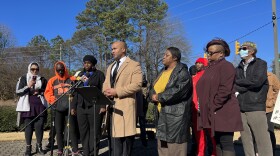October in American culture is decorated with death. But after Halloween, we put the fake skulls and tombstones back in the box in the attic, to be forgotten until next year’s celebration of the macabre. Tanya Marsh, however, pays homage to death all year long.
She is a law professor at Wake Forest University and teaches one of the nation’s few, if not only, courses on funeral and cemetery law. After focusing on commercial property law for a decade, she turned her fascination with cemetery law into a full-blown specialization. She hosts the podcast “Death, et seq.” in an effort to open the topic of her class to anyone interested in the evolving death industry.
This conversation about our relationship with death and the dead is part of the series “Embodied: Sex, Relationships and Your Health.” Host Anita Rao talks with Marsh about the intersection of death and the law, and how we live in a death-denying culture.
Interview Highlights
On the rights of the dead and the problems they cause the living:
In the United States, the dead have rights. The dead have the right to a decent burial, and then they have a right to [be] undisturbed … So you have these really strong rights, and then you have some duties and obligations put on the living in order to protect them. But if you don't put physical traces on the ground — like a tombstone, like a big sign that says cemetery or recorded deed or, you know, something to alert the living to their presence — people can forget, right? I mean, families die out, or they move on, and we forget rather quickly. And so then you can uncover bodies as part of construction or farming or natural disasters. And that unfortunately happens all the time. So we have this real ongoing tension between these real, strict rigid protections of the dead. And then the practical reality that we don't always live up to that.
'Death in the United States is not woven into the fabric of life.'
On the changing funeral industry:
There's an increased interest in environmentalism and the "traditional" burial. Embalming and then a steel casket and a concrete vault is perceived by many people to be very consumptive and sort of anti-environmentalist. And then also, I think that there's this really strong thread of consumers wanting to have more control over fundamental life activities that they want excluded from the personal sphere … An interest in controlling your own funeral and disposition is, I think, similar to wanting to go to a farmers market on a Saturday, right? Where we outsource death the same way we outsource caring [...] for the sick, and you know, food production and everything else.
On the singularity of American burial practices:
You also have grave recycling in many parts of the world. So this idea that we're going to occupy a single grave in perpetuity is an American idea, because we just had so much land. But places where land is much more precious, you're going to get a lease for 15, maybe 50 years, then after that period of time, they're going to dig out whatever hasn't decomposed yet, put that into a communal or mass grave, and then release the space to somebody else. So [in] America, we think that everybody does it [our] way. And really, nobody does it [our] way.











